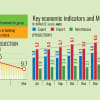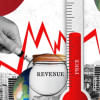Can we be optimistic about Bangladesh?

Of course. Despite challenges around, we have many reasons to be optimistic about Bangladesh.
On the face of it, Bangladesh's economic situation may not give us much hope but on a deeper analysis of the underlying situation, there is a lot to be optimistic. The major challenges for Bangladesh right now are clear: currency devaluation, shrinking reserves, corruption, talent drain of skilled workers, policy ambiguity, challenges of graduation from LDC and an unstable and undercapitalised financial sector. The positives we will focus on are the key strengths which have recently gotten overlooked such as the population dividend of Bangladesh, the strength of consumption and the continuing interest of international organisations.
The population dividend of Bangladesh is yet to be fully realised and even though the state of education needs serious attention, the size of the population presents a strong value proposition for businesses. Production is cost-competitive and despite the upcoming graduation to a middle-income country, including the loss of trade advantages, labour-intensive industries will continue to find the lower wages a competitive advantage. The RMG industry, especially, needs to adapt to the new situation by investing in man-made fibre and alternative textiles in order to move into higher value-added items. The positive news is that some of the biggest exporters in the country are already moving into these items. I met seniors from two development partners and eight local corporates from Dhaka and Chittagong last week. Though some of them looked uncertain and to some extent confused, they still are thinking of expansion, further investment and going beyond.
The strength of the consumption market is one of the biggest success stories in Bangladesh and has been the result of a sustained multi-decade campaign by consumer companies in Bangladesh. Despite the impact of Covid-19, when spending slowed down in many ways, we saw the consumer market sustain demand and companies were able to raise revenue even though their bottom lines took a hit due to rising input costs. Consumption is expected to continue rising and prominent companies as mentioned are highly optimistic about the economy.
There is large incoming investment in the infrastructure across sectors and we can expect that there will be a lot of investment with foreign and local partners to improve all economies. Padma Bridge is the first of a series of major infrastructural projects such as the Matarbari port and a series of public private partnership projects are likely to super-charge economic activity.
We have also been seeing a renewed interest in automobile and consumer companies in entering Bangladesh. These companies are emblematic of the belief in Bangladesh as an economy. HSBC's recent report of Bangladesh becoming a trillion-dollar economy by 2030 is also based on the power of consumption. Added to this also their new report on the prospects of Bangladesh capital market.
One of the major roadblocks to private and public investment is of course the upcoming election. Both private companies and international organisations are unsure about their investment plans as they wait to see who will be coming to power and how do they prioritise their reforms agenda. However, irrespective of who comes to power, the development partners are likely to support the private sector and ensure the growth continues.
I would today conclude with a simple sentence that I heard from the head of a development partner institution mainly supporting private sector investment in this region. It seemed to him "foreigners are more optimistic about Bangladesh than we locals are".
Hence, it is time to justify our faith in Bangladesh's growth story and move forward with more hopes, confidence and innovation. May be, we professionals need to be more articulate, steadfast and logically courageous too.
The writer is an economic analyst.

 For all latest news, follow The Daily Star's Google News channel.
For all latest news, follow The Daily Star's Google News channel. 








Comments